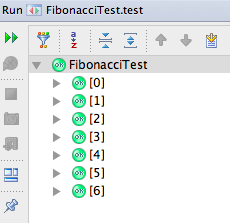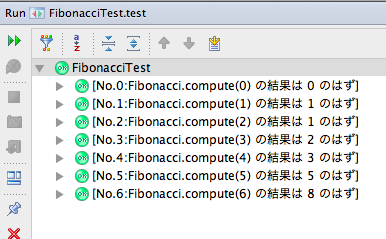JUnit4.11から@Paremetersで名前を指定できるようになった
前までは
というような味気無い表示でどんなテストケースなのかよくわからなかった@Parameterアノテーションですが、JUnit4.11からにname属性を指定できるようになったようです。
https://github.com/junit-team/junit/wiki/Parameterized-tests#identify-individual-test-cases
{index}でパラメータの添字を{0}, {1}, …でパラメータのn番目の値を表示できます。
以下の例では
@Parameters(name = "No.{index}:Fibonacci.compute({0}) の結果は {1} のはず")
というようにしています。
例
import org.junit.Test; import org.junit.runner.RunWith; import org.junit.runners.Parameterized; import org.junit.runners.Parameterized.Parameters; import java.util.Arrays; import static org.hamcrest.CoreMatchers.*; import static org.junit.Assert.*; @RunWith(Parameterized.class) public class FibonacciTest { /** 入力値 */ private final int input; /** 期待値 */ private final int expected; /** * コンストラクタ。 * * @param input 入力値 * @param expected 期待値 */ public FibonacciTest(int input, int expected) { this.input = input; this.expected = expected; } /** * テストデータ。 * <pre> * [0]:入力値 * [1]:期待値 * </pre> * * @return テストデータ */ @Parameters(name = "No.{index}:Fibonacci.compute({0}) の結果は {1} のはず") public static Iterable<Integer[]> testData() { return Arrays.asList(new Integer[][]{ {0, 0}, {1, 1}, {2, 1}, {3, 2}, {4, 3}, {5, 5}, {6, 0} }); } /** 実際に実行されるテストメソッド。 */ @Test public void test() { assertThat(Fibonacci.compute(input), is(expected)); } /** テスト対象クラス */ public static class Fibonacci { public static int compute(int n) { if (n == 0) return 0; if (n == 1) return 1; return compute(n - 1) + compute(n - 2); } } }
ちなみに。。
Eclipseだと、name属性に丸括弧を使うと表示が途切れるバグがあるらしいです。
https://bugs.eclipse.org/bugs/show_bug.cgi?id=102512

